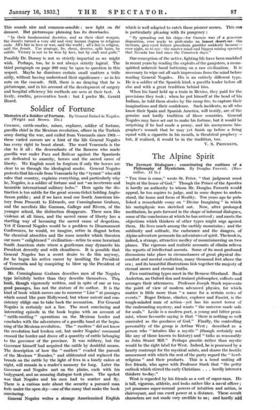Soldier of Fortune
Memoirs of a Soldier of Fortune. By General Rafael de Nogales. (Wright and Brown. 21s.) COWBOY, cattle-rustler, miner, explorer, soldier of fortune, guerilla chief in the Mexican revolution, officer in the Turkish army during the war, and exiled from Venezuela since 1901— these varied careers are a hint of the life General Nogales has every right to boast about. The word Venezuela is the clue to it all : the descendants of the llaneros who made guerilla war under Paez and Bolivar against the Spaniards are dedicated to anarchy, horses and the sacred cause of liberty. We English must be forgiven if only the horses arc clear to us through the ideological smoke. General Nogales protests that his exile from Venezuela by the " tyrant" who still rules that country, explains everything, and particularly why he, Nogales, is a soldier of fortune and not "an inveterate and incurable international military hobo." Here again the dis- tinction is too subtle for the great season-ticket holding Anglo- Saxon public ; and if we have read our South American his- tory from Prescott to Edwards, our Cunninghame Graham, and the novelists like Guzman, Gallego and Rivera, of the younger school, the distinction disappears. These men like violence at all times, and the sacred cause of liberty has a startling way of becoming the sacred cause of despotism. Yet if General Nogales would be a problem to Disarmament Conferences, he would, we imagine, retire in disgust before the chemical atrocities and the mass murder which threaten our more " enlightened " civilization—retire to some luxuriant South American state where a gentleman may dynamite his President decently and with cleanliness. It is possible that General Nogales has a secret desire to do this anyway, for he began his active career by insulting the President of Venezuela and by conspiring to blow up the President of Guatemala.
Mr. Cunninghame Graham describes men of the Nogales type infinitely better than they describe themselves. This book, though vigorously written, and in spite of one or two good passages, has not the stature of its author. It is the kind of book which moves one to murmur " Liar " at passages which sound like pure Hollywood, but whose naivete and con- sistency oblige one to take back the accusation. For General Nogales is certainly not a liar. The most convincing and interesting episode in the book begins with an account of " cattle-rustling " operations on the Mexican border and concludes with the adventures of a guerilla band at the begin- ning of the Mexican revolution. The " rustlers " did not know the revolution had broken out, but under Nogales' command crossed the border and drove off a quantity of cattle belonging to the governor of the province. It was robbery, but the Governor himself had acquired the cattle by doubtful means. The description of how the " rustlers " evaded the pursuit of the Mexican " Rurales," and obliterated and replaced the brands on the cattle by the light of fires in a lonely cation at night, will remain in a reader's memory for long. Later the Governor and Nogales met on the plains, each with his bodyguard, and an amazing dialogue took place. The upshot was that Nogales and his men had to scatter and fly. There is a curious note about the security a pursued man feels under the open sky—one of the many that make the book convincing.
General Nogales writes a strange Americanized English which is well adapted to catch these pioneer scenes. This one is particularly pleasing with its pungency : " By spreading out his chips—for Garrete was of a generous disposition, ever ready to grub-stake an ibouest t-rat--the taciturn, grey-eyed former greenhorn gambler suddenly became— over night, so to say—the master mind and biggest mining operator that Nevada has had since the Comstock days."
Our conception of the active, fighting life have been muddied in recent years by reading the exploits of the gangsters, a mean- spirited unheroic band battening on a raw civilization. It is necessary to wipe out all such impressions from the mind before reading General Nogales. His is an entirely different type. He is a soldier of the Spanish kind, a guerilla leader before all else and with a great tradition behind him.
When his band held up a train in Mexico, they paid for the provisions they took ; when he put himself at the head of his Indians, he told them stories by the camp lire, to capture their imaginations and their confidence. Such incidents, as all who know their Spain and Spanish America, will testify, are of the genuine and lordly tradition of those countries. General Nogales may have set out to make his fortune, but it would be surprising if he had made a penny, and his anonymous bio- grapher's remark that he may yet finish up before a firing squad with a cigarette in his mouth, is theatrical prophecy—. but, if realized, it would be in the tradition, too.
V. S. PRITCHETT,


































 Previous page
Previous page